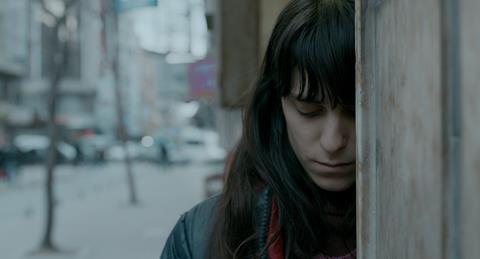Dir/scr: Emine Emel Balci. Turkey-Germany. 2015. 94mins

A grimly realistic portrait of a teenage textile factory worker at war with the entire world, the beginning of Emine Emel Balci’s debut film looks a bit like Turkey’s answer to the Dardenne brothers’ Rosetta. In Until I Lose My Breath (Nefesim Kesilene Kadar), the main character, Serap, (Esme Madra) rushes furiously through the streets of Istanbul, with a hand-held camera behind her, chasing her in a long, tense travelling shot which will be repeated time and again through the film, to convey the state of constant despondency she is in.
Madra’s one-note performance of the crucial part may be adequate in these circumstances, but does little to endear her on the audience.
But unlike the Dardennes, Balci relentlessly drives her lead character in a vicious circle leading nowhere. One defeat follows another, she loses her faith in family and friends, abandons any moral inhibitions she might have had to gain nothing in exchange, leaving her at the end of the picture in pretty much the same state she had been when picked up by the camera for the movie’s first shot.
Serap’s only wish in life, the one goal she desperately pursues, is to find a place of her own she can share with her father, a gloomy long distance trucker who had apparently driven her mother to an early death. After her mother passed away she was first put in an orphanage and later moved to her older sister’s flat, to be terrorised by her brother in law who expects her to hand over her wages as soon as she gets them on a weekly basis.
Her only hope is that her father will quit the job that keeps him away from her all the time, find another one in town and rent a flat where she could move in with him. She saves every penny she makes working overtime in a stifling, crowded, sweatshop, pestering him every time she gets the chance to do something about it, admonishing him in a kind of upside down relationship in which she the responsible adult and he, the irresponsible brat, to settle down once and for all. She even offers him all the money she has secretly saved, to help pay her own share of the future rent.
Evidently adept of the theory that penury turns men into beasts, Balci keeps her embittered heroine enslaved to an obsession that blinds her from the obvious, allowing her to find out long after her audience had already done so, that her father doesn’t really appreciate the idea of living next to her on a permanent basis. Par for the course, since Balci’s opinion of the male se - at least the Turkish variety- is apparently pretty low, judging by the unsavory examples featured in the film.
The film’s nervous pace and angry mood fit Balci’s intentions like a glove, but this is not the case with skeletal script which is badly in need of some real flesh on its bones. Resorting to frequent repetitions to fill up the gaps, Serap is stuck in one place and all her running around ultimately leads her nowhere.
Madra’s one-note performance of the crucial part may be adequate in these circumstances, but does little to endear her on the audience. Even if she gains some sympathy in the early stages for being a typical victim of the social system around her, that sympathy gradually evaporates as it becomes obvious that neither she nor the script have any idea where to go and what to do, short of repeating what has been said and done before.
Production company: Prolog Film
International sales: Una Film, haagmann@unafilm.de
Producer: Nadir Operli
Cinematography: Murat Tuncel
Editor: Dora Vajda
Production designer: Meral Efe Yurtseven, Yunus Emre Yurtseven
Music: Nimet Inkaya
Main cast: Esme Madra, Riza Akin, Sema Kecik, Gizem Denizci, Ugur Uzunel, Ece Yuksel







![The Brightest SunScreen[Courtesy HKIFF]](https://d1nslcd7m2225b.cloudfront.net/Pictures/274x183/3/5/0/1448350_thebrightestsunscreencourtesyhkiff_312678.jpg)













